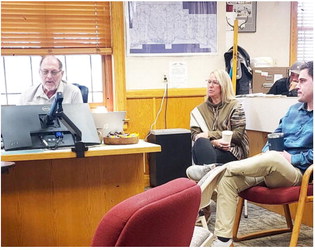American Prairie Sues DNRC For Bison Grazing Permits
American Prairie says it has no other option than to sue the Gianforte administration and Montana Department of Natural Resources and Conservation because the agency refuses to complete an environmental review and issue a grazing lease for a portion of its bison operations.
American Prairie, a nonprofit organization dedicated to creating and maintaining one of the nation’s largest nature reserves, owns large swaths of property and has been dedicated to promoting and preserving prairie land and graze bison. It also offers hunting and recreational opportunities throughout central, northern and eastern Montana.
In a lawsuit filed in Lewis and Clark County District Court, American Prairie said that it renewed a grazing lease, originally granted by the state in 2009, when it expired in 2019. Since then, though, the lawsuit said that the department has sat on the application, arguing at times that it was not bound to the Montana Environmental Policy Act, and conversely that the Act allowed it to take no action on the grazing renewal.
The state DNRC said it has told American Prairie officials that because the land is adjacent to federal grazing land leased by the U.S. Bureau of Land Management, it is awaiting a final decision about bison grazing there before taking action on its state permit. Currently, the Gianforte administration is challenging the federal lease to American Prairie, saying that federal grazing law does not allow bison, but a federal administrative judge previously rejected that argument and refused to stop American Prairie’s bison grazing. The Gianforte has appealed that federal decision, and court filings say it could take years to resolve. But for now, the federal leases remain intact.
The legal dispute appears to be part of an ongoing campaign by Gov. Greg Gianforte and Montana Attorney General Austin Knudsen, both Republicans, to push back against American Prairie, which they say threatens Montana cattle and beef producers. However, American Prairie’s origins remain rooted in the conservative conservation policies championed by Bozeman-based Property and Environmental Research Center, which advocates for conservation by private property acquisition.
Timelines In court documents, American Prairie said that it submitted a completed application to the DNRC in 2019, requesting approval for bison grazing on state trust lands. DNRC requires a review under MEPA laws, but the conservation group argues that state law sets out a specific timeline. It argues that the DNRC must complete a public scoping within 60 days of a completed application, and an environmental review with in 90.
According to court documents, neither action has happened — something the agency doesn’t appear to dispute.
However, American Prairie officials say that despite communication to DNRC Director Amanda Kaster and though department officials recommended approving the lease, the agency has not yet acted on the six-year-old application. Attorneys Mary Cochenour and Matthew Cochenour of Helena, who are representing American Prairie, say that the DNRC has used contradictory legal rationale — at times arguing that the agency isn’t subject to MEPA statutes as a state agency, while also telling American Prairie that MEPA allows it to “take no action” on a state lease, something the conservation group disputes.
American Prairie is taking a rare legal move of filing for a writ of mandamus, a legal maneuver that asks a court to compel a person or agency to complete a task outlined in law. The lawsuit also asks the court to declare that the DNRC has intentionally ignored the request and should be forced to order the grazing permit since American Prairie says the permit complies with law and the organization has used the grazing land previously.
The lawsuit also alleges that the DNRC has granted bison grazing permits on other parcels of state, including noted media mogul Ted Turner’s land. The group alleges that not only has its due process rights been violated, but it has been targeted for unequal treatment.
The lawsuit also claims that MEPA was revised more than 20 years ago by the 2001 Legislature to include a timeline of approval so that the law couldn’t be used to delay decisions indefinitely, which they say is now the case.
“The 2001 Montana Legislature, concerned that MEPA was being used as an obstructionist tool to delay projects, imposed strict timelines for agencies to complete environmental review with the goal of accelerating environmental review,” the lawsuit said. Cattle, Bison, Montana Law
American Prairie also pointed out in its court filing that Montana law doesn’t differentiate between cattle and bison. According to the lawsuit, the department manages the land based on a measurement called “animal units month.” Essentially the statistic is meant to gauge the “carrying capacity” of any piece of land. For example, grazing sheep or smaller animals on land takes less forage, water and may have lesser impact on soil and vegetation as the same number of larger animals, like cattle. Since 2009, Montana has applied one AUM for cattle and bison, meaning they’re measured identically by grazing officials.
While American Prairie said that some changes to the lease — like changing use from grazing to agriculture or recreation — would take a review, state trust leases do not require a change on a grazing lease depending on animal, so long as they obey the AUM limits.
“Although the state leases themselves do not require agency approval for change of class, DNRC has long required MEPA environmental review from changing grazing from cattle to bison on state lands,” the lawsuit said.
The DNRC last month told American Prairie officials that it was waiting until a final decision was reached by federal officials, although that could take years.
“DNRC has refused to perform its own independent MEPA analysis related to bison grazing on state trust lands until its appeals of the federal final decision are resolved, even though DNRC is not bound by such federal action,” the lawsuit said. “The appeals could be active for years and could outlive the 10-year leases.”
Currently the federal leases are being reviewed by the BLM’s Office of Hearings and Appeals, and the lawsuit notes that there are multiple levels of challenges that could continue, including going as far as the United States Supreme Court, likely years aways.
“DNRC cannot both require MEPA analysis and, at the same time, invoke an exemption to avoid MEPA procedures, which is exactly what the agency is doing here. Either MEPA applies, or it does not,” the lawsuit said. “DNRC’s expansive interpretation of the MEPA exemption statute— using it to garner authority to not act all all on any decision, MEPA or otherwise — is an abuse of the agency’s authority and, at best, an arbitrary and capricious and unlawful act by the agency.”
American Prairie said that in addition to legal costs, which it is asking the courts to award, it has now been forced to purchase thousands in materials and spend time to comply with the DNRC’s delaying a decision.
The Daily Montanan reached out to officials with the Montana DNRC about the lawsuit, and they said they are reviewing it, but generally do not comment on active litigation.



